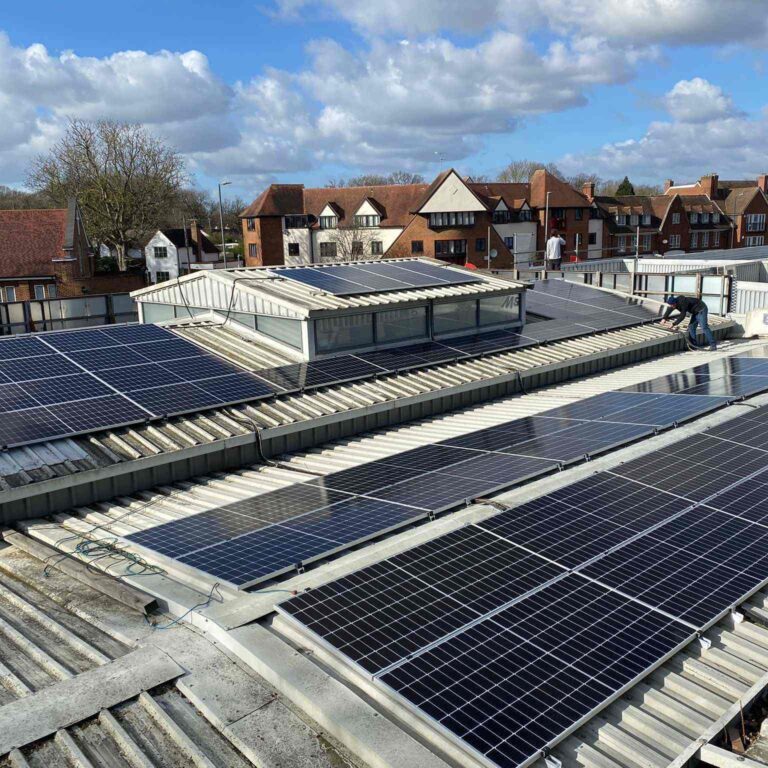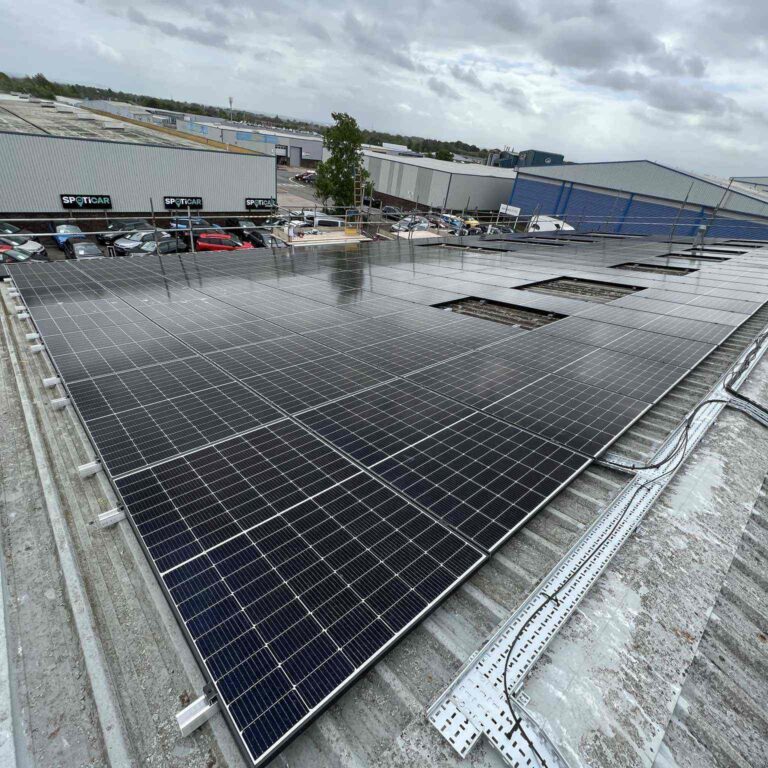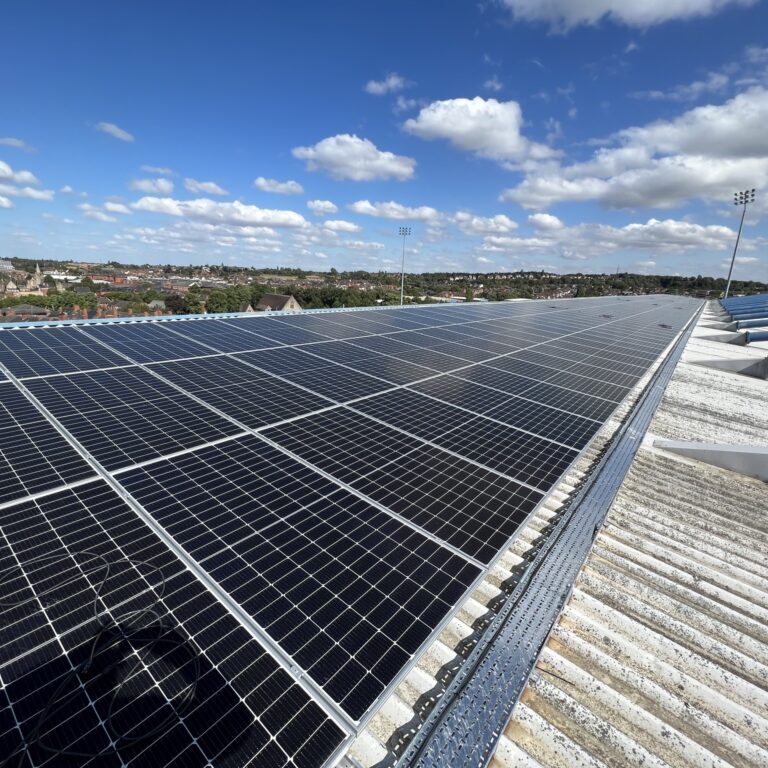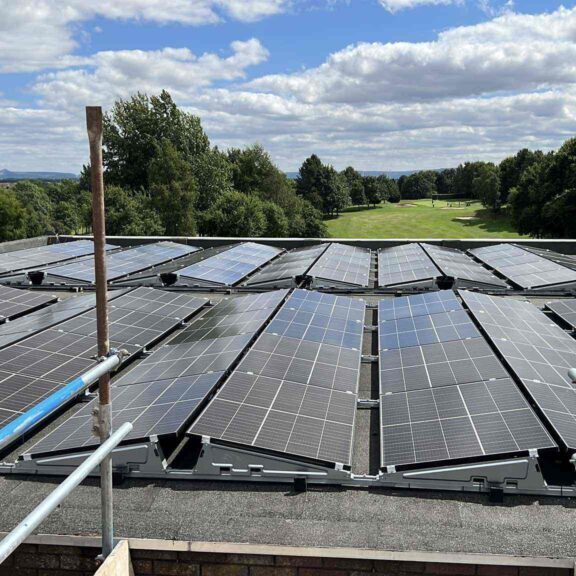As the world moves towards more sustainable energy solutions, UK businesses are increasingly seeking innovative ways to reduce carbon footprints, save on energy costs, and support environmental goals. One such emerging solution is agrivoltaics—a system that combines solar energy production with agricultural land use. Agrivoltaics presents a unique opportunity for UK companies, particularly those in the agricultural sector, to optimize land use, increase energy efficiency, and contribute to a more sustainable future. This article explores the concept of agrivoltaics, its benefits for commercial solar applications in the UK, and why businesses should consider this dual-use approach to land management.
Understanding Agrivoltaics
Agrivoltaics refers to the simultaneous use of land for both solar power generation and agricultural activities. This approach involves installing solar panels above crops or grazing fields, allowing the same land to produce both food and energy. By integrating solar arrays with farming, agrivoltaics offers a way to maximize the productivity of agricultural land while also contributing to renewable energy goals.
In the UK, where land availability can be a significant constraint, agrivoltaics provides a practical solution for businesses that want to invest in solar energy without compromising agricultural output. By allowing farmers and landowners to benefit from both agriculture and solar energy production, agrivoltaics can enhance the economic viability of farming while supporting the UK’s renewable energy targets.
Key Benefits of Agrivoltaics for UK Businesses
1. Maximizing Land Use Efficiency
Land is a valuable and often limited resource in the UK, especially in agricultural regions. One of the most significant advantages of agrivoltaics is its ability to maximize land use efficiency by enabling dual-purpose land use. Instead of choosing between agricultural production and solar energy generation, agrivoltaics allows both to coexist on the same plot of land.
For UK businesses, particularly those in agriculture, this means they can generate additional revenue from solar energy without sacrificing crop yields or livestock productivity. The solar panels in an agrivoltaic system can also provide partial shade, which can benefit certain crops by protecting them from excessive heat or reducing water evaporation. This dual benefit makes agrivoltaics an attractive option for farmers looking to diversify their income streams and make better use of their land.
2. Reducing Energy Costs and Enhancing Sustainability
Energy costs are a significant concern for UK businesses, especially those with high energy demands such as farming operations. By investing in agrivoltaics, businesses can reduce their reliance on grid electricity, lower energy costs, and enhance their sustainability credentials. Solar energy produced through agrivoltaics can be used to power farming operations, such as irrigation systems, processing equipment, and refrigeration, thereby reducing operational expenses.
Additionally, by producing renewable energy on-site, businesses can decrease their carbon footprint and contribute to the UK’s goal of reaching net-zero emissions by 2050. Agrivoltaics not only helps businesses save money on energy bills but also aligns them with national and global sustainability targets, which can be a significant advantage in an increasingly eco-conscious market.
3. Supporting Agricultural Resilience
Agriculture in the UK faces various challenges, including changing climate conditions, soil degradation, and water scarcity. Agrivoltaics can play a role in enhancing the resilience of agricultural systems by providing benefits such as microclimate regulation, improved soil moisture retention, and protection from extreme weather events.
The shade provided by solar panels can help reduce soil evaporation and keep crops cooler during hot spells, which is particularly important as the UK experiences more frequent and intense heatwaves due to climate change. In addition, the structure of solar panels can act as a windbreak, reducing the impact of strong winds on crops. By creating a more stable growing environment, agrivoltaics can help farmers maintain consistent crop yields, even in the face of adverse weather conditions.
4. Enhancing Biodiversity
One of the less obvious but significant benefits of agrivoltaics is its potential to enhance biodiversity on agricultural land. The spaces between and underneath solar panels can be managed to create habitats for wildlife, such as pollinators, which are crucial for many crops. By promoting biodiversity, agrivoltaics can support ecosystem services that are beneficial to agriculture, such as pollination and pest control.
For UK businesses, particularly those focused on sustainable farming practices, this integration of solar energy and biodiversity management can be a powerful way to demonstrate environmental stewardship. Moreover, enhancing biodiversity can improve soil health, boost crop resilience, and contribute to the overall sustainability of agricultural systems.
5. Generating Additional Revenue Streams
Agrivoltaics offers UK businesses the opportunity to generate additional revenue streams by combining agriculture with solar energy production. The energy generated from solar panels can be used on-site to reduce energy costs, or it can be sold back to the grid under schemes like the Smart Export Guarantee (SEG), providing an additional income source.
Furthermore, businesses that adopt agrivoltaics can potentially benefit from government incentives and subsidies designed to encourage renewable energy adoption and sustainable farming practices. These financial incentives can help offset the initial investment costs of installing solar panels, making agrivoltaics an economically viable option for businesses of all sizes.
The Agrivoltaics Market in the UK
1. Growing Interest and Investment
The concept of agrivoltaics is gaining traction in the UK as businesses and policymakers recognize the potential of this dual-use approach to land management. With the UK government’s commitment to expanding renewable energy capacity and supporting sustainable agriculture, there is growing interest in agrivoltaics as a way to achieve these goals.
Investors and companies are beginning to explore agrivoltaic projects, seeing them as a way to enhance the economic viability of agricultural operations while contributing to the country’s renewable energy targets. As the market for agrivoltaics grows, UK businesses that adopt this approach early stand to benefit from the first-mover advantage, positioning themselves as leaders in sustainability and innovation.
2. Challenges and Considerations
While the potential benefits of agrivoltaics are significant, there are also challenges that need to be addressed for the widespread adoption of this technology in the UK. One of the primary challenges is the initial cost of installing solar panels, which can be a barrier for smaller businesses. However, with the availability of government incentives and financing options, these costs can be mitigated.
Another consideration is the need for careful planning and design to ensure that the solar panels and agricultural activities are compatible. Not all crops or farming practices may be suitable for agrivoltaics, so it’s essential to select the right combination of solar technology and agricultural use to maximize the benefits.
Lastly, there may be regulatory and zoning challenges, particularly in areas where land use is tightly controlled. However, as agrivoltaics becomes more widely recognized and accepted, these regulatory barriers are likely to diminish, making it easier for businesses to implement this innovative solution.
3. Future Outlook
The future of agrivoltaics in the UK looks promising, with increasing recognition of its potential to address some of the key challenges facing the country’s energy and agricultural sectors. As more businesses explore the benefits of combining solar energy with agriculture, the market for agrivoltaics is expected to grow, creating new opportunities for investment, innovation, and sustainability.
For UK businesses, particularly those in agriculture, agrivoltaics represents a forward-thinking approach to land management that can enhance productivity, reduce costs, and support environmental goals. By adopting agrivoltaics, businesses can position themselves at the forefront of the sustainability movement, driving positive change while also benefiting from the economic advantages of renewable energy.
Why UK Businesses Should Consider Agrivoltaics
1. Aligning with Sustainability Goals
Sustainability is increasingly becoming a key priority for UK businesses, driven by consumer demand, regulatory requirements, and the need to mitigate climate change. Agrivoltaics offers a practical solution for businesses looking to align their operations with sustainability goals. By generating renewable energy and supporting agricultural productivity on the same land, agrivoltaics helps businesses reduce their environmental impact and contribute to a more sustainable future.
For companies that prioritize corporate social responsibility (CSR), adopting agrivoltaics can enhance their brand reputation and appeal to environmentally conscious consumers, investors, and stakeholders. In a competitive market, demonstrating a commitment to sustainability can be a significant differentiator, helping businesses attract and retain customers who value ethical practices.
2. Enhancing Economic Resilience
In an era of rising energy costs and economic uncertainty, agrivoltaics offers a way for UK businesses to enhance their economic resilience. By producing their own renewable energy, businesses can reduce their exposure to volatile energy prices and ensure a stable, long-term energy supply. This is particularly important for agricultural businesses, where energy costs can be a significant portion of operating expenses.
Moreover, the additional revenue streams generated from selling excess energy back to the grid can provide a financial buffer, helping businesses weather economic fluctuations and invest in further growth and innovation.
3. Supporting the UK’s Renewable Energy Targets
The UK has set ambitious targets for expanding renewable energy capacity and reducing carbon emissions. Agrivoltaics can play a crucial role in helping the country meet these targets by enabling the simultaneous production of food and clean energy on the same land. For businesses, this represents an opportunity to contribute to the national effort to combat climate change while also benefiting from the economic advantages of renewable energy.
By adopting agrivoltaics, UK businesses can be part of the solution to the country’s energy challenges, supporting the transition to a low-carbon economy and helping to secure a sustainable future for all.
Conclusion
Agrivoltaics is an innovative and sustainable solution that offers significant benefits for UK businesses, particularly those in the agricultural sector. By combining solar energy production with agricultural activities, agrivoltaics maximizes land use efficiency, reduces energy costs, enhances sustainability,



